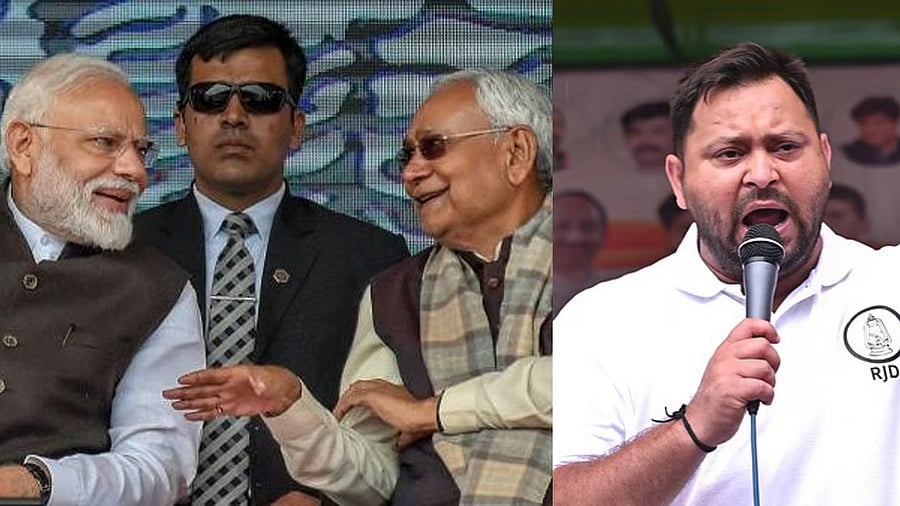
PM Narendra Modi, Bihar CM Nitish Kumar (left) and RJD leader Tejashwi Yadav.
Credit: PTI photo, Credit: X/@RJDForIndia
All adults, expected to earn an income for living, need a job. All adults are also voters, and the political parties need their votes to win elections. Given this, politicians’ obsession for being seen as creating jobs is quite understandable.
Essentially, it is not politicians but economic production systems and entrepreneurs that create jobs. Politicians legislate and spend public resources to do the ‘politics of jobs’.
The campaign for the Bihar assembly polls is in full swing, and so is the ‘politics of jobs’.
A few days before the Election Commission of India declared the dates for the polls, Bihar Chief Minister Nitish Kumar announced a Mukhyamantri Mahila Rojgar Yojana (MMRY), promising job assistance of Rs 2 lakh to women.
Prime Minister Narendra Modi, shedding all his pretentions of not doing rewdi (freebie) politics, transferred the first instalment of Rs 10,000 each to 75 lakh women voters. Kumar also released Rs 10,000 to another 21 lakh women. Further instalments are being released. By now, an estimated 1.21 crore women voters in Bihar have received Rs 10,000.
Tejashwi Yadav, leading the Opposition in Bihar, pulled a rabbit out of a hat. If voted back to power, he has guaranteed to give a government job to one person in every family that currently has none. Bihar has about 25 million families, and about 2.5 million Biharis have government jobs. Yadav’s announcement will require creating about 10 times the current government jobs!
Thus, it’s clear that a fierce battle of bad job ideas is raging in Bihar.
Why do politicians resort to horrendous schemes in the name of creating jobs? What do these schemes mean for the Bihar government’s finances and economy? Is there a better option?
A political bribe
The MMRY scheme promises Rs 2 lakh assistance to every Bihari woman (except those with a government job or paying income tax) who registers for the scheme and promises to set up a business.
The MMRY, hurriedly designed to pass on Rs 10,000 to Bihar women before the two-phase election, is a poor copy of the National Rural Livelihood Mission (NLRM)/Ajeevika, which encourages setting up small/tiny businesses by poor women through Self-Help Groups (SHGs) using the bank linkage model.
The NLRM is under implementation in all 38 districts in Bihar, and has mobilised 1.34 crore Bihar households/women under 11.16 lakh SHGs. MMRY cannot create any additional jobs over and above NLRM.
The MMRY is a plain and simple device to bribe women voters with Rs 10,000 handouts. The MMRY’s funding mechanism has been deliberately left vague.
Banks have already provided over Rs 21,874 crore through the NLRM to SHGs. If the government were to provide Rs 2 lakh from the state Budget, it would cost Rs 2.5-3 lakh-crore. Bihar’s annual Budget is about Rs 3 lakh-crore. Thus, the MMRY will bankrupt Bihar.
From this, it appears that the ruling dispensation does not care about creating jobs for Bihar’s women or for the state’s fiscal soundness. It just wants the MMRY job rewdi to help it retain power in Bihar.
An impractical promise
Bihar is a predominantly agriculture-oriented economy. There is very little gross capital formation (investment) in manufacturing and other productive assets, leading to an acute dearth of industrial and services jobs. No wonder, Biharis value government jobs, or migrate to other states in search of jobs.
The reality of government jobs in Bihar is also quite stark. Bihar has not seen any increase in the number of government servants in last 2-3 decades. Increasing digitalisation makes the creation of more government jobs quite unlikely, and unjustified.
Yet, Bihar’s Opposition leader has promised a job for every family. Conveniently, the details of the scheme have not been spelt out.
If Yadav wins and forms the next government, it will most likely end up creating many para-government jobs, mostly in rural areas, on a fixed monthly remuneration basis. Even if his government pays the para-workers Rs 10,000 a month, it will cost about Rs 2.5 lakh-crore to hire 2 crore para-workers — this is financially impossible!
This promise is nothing but a cheap trick to hoodwink Biharis into voting for him.
New ideas needed
All over the world, manufacturing and jobs are undergoing a massive transformation. Agriculture, which employed a majority of the population for most of human civilisation, has shed jobs all over the world (India is an exception, with 45% of workers still in agriculture).
In the last 250 years, the world has witnessed the transformation of agricultural jobs into industrial jobs. Automation has, however, stopped job-creation in the industrial sector as well.
Currently, digitalisation and artificial intelligence (AI) are upending intelligent/white collar jobs.
These transformations have made the economies more productive, but have significantly brought down the employment/job intensity of the GDP.
Politicians need to realise this reality, and look ahead. Instead of creating illusions of creating government jobs or maintaining a façade of creating jobs, they must think of raising more income and wealth tax revenues from the rich who reap most of the income currently, and provide a kind of universal basic income scheme for the unemployed to pursue a reasonably good quality life.
India needs a competition of good ideas, not a battle of fake job-creation schemes.
(The writer is Subhash Chandra Garg, a former Finance & Economic Affairs Secretary, and author of ‘The Ten Trillion Dream Dented’, ‘Commentary on Budget 2025-2026’, and ‘We Also Make Policy’.)
Disclaimer: The views expressed above are the author's own. They do not necessarily reflect the views of DH.